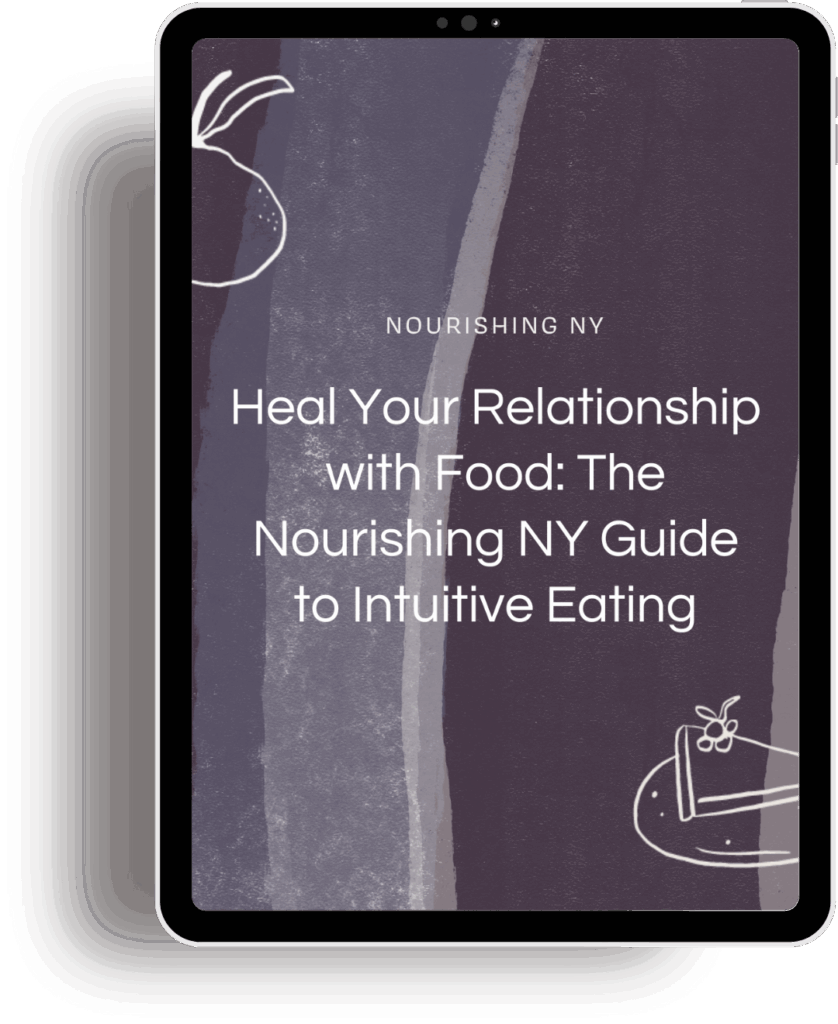When you schedule that initial Discovery Call or reach out to a Registered Dietitian for the first time, it can be nerve-racking. You may not know what to expect from sessions or know anything about the dietitian’s counseling style. Here at Courtney Darsa Nutrition we want to be as transparent as possible with our clients about our non-diet, weight-neutral approach to nutrition. As you read on, you will be able to gain a better understanding of what to expect from a weight-neutral practice and hopefully debunk any misconceptions.
What principles can I expect weight-neutral dietitians to incorporate?
In order to help clients regain trust with their body and mend their relationship with food, weight-neutral dietitians will utilize the Principles of Intuitive eating and the Health at Every Size (HAES) paradigm. Intuitive Eating is not a diet. It is an evidence-based approach to eating that allows you to listen to your fullness and hunger cues and ultimately stop the vicious cycle of crash dieting. This method of eating was created by two dietitians, Evelyn Tribole and Elyse Resch in 1995. 1 There is no tracking of calories, carbs, macros, or elimination of food groups. It is all about eating in accordance with your internal cues rather than the food rules tied to diets. All in all, trusting your body to let you know what you need for proper nourishment. HAES is also an alternative to a weight-centered approach and promotes size acceptance, joyful movement, and balanced eating.
What topics can I expect to discuss with a weight-neutral dietitian during counseling sessions?
Here at Courtney Darsa Nutrition we take a holistic approach to health, meaning we will discuss topics beyond food intake during counseling sessions. Our appetite and food cravings are often connected to daily physical activity, sleep, and stress levels. As weight-neutral dietitians we will not judge your food choices or tell you specific quantities of foods you should eat. In fact, we do not encourage the measuring of macros and counting of calories. This can limit how much we can have at a given meal which is not practical. The best choices for your health are guided by your body’s internal system. Rather than limiting the types and amounts of foods you can have at an eating occasion, we will encourage you to make sure you are choosing foods that you enjoy and eat according to your internal signals. Take a moment to think about whether you are satisfied or still hungry, knowing you can always go back for more. Diet rules do not allow us to honor our day-to-day cues which can mean some days we eat a little more carbohydrate sources or less protein foods make up our plate. As you begin to tune into your hunger and fullness signals you will learn that YOUR body will be the one to tell you what you need instead of these external sources just mentioned. No diet will ever be prescribed and we will never tell you to stop enjoying your favorite foods. Forming a healthy relationship with food and your body will not happen after just one session as it takes time and commitment, but we will meet you where you are at and go at your pace throughout the process.
Does a weight-neutral approach mean anti-weight loss?
While the principles of Intuitive Eating do not focus on weight at all, it does not mean that it cannot result in weight change. You may lose weight, gain weight, or stay the same. Because weight is seen as neutral, this weight change is not judged as good or bad. Eating intuitively is a skill for healing your relationship with your body and food, it is not an approach for intentionally changing your body shape and size. Ultimately the behaviors associated with trying to lose weight do not align with the framework of intuitive eating. If years of damage have been done to your body with restricting or bingeing, then you may find your body shifting back to its set-point once you begin to honor your nutritional needs. One’s set-point is a weight range where the body functions at its most optimal levels. This is a range that your body has been genetically and biologically predisposed to maintain through bodily systems like hunger and metabolism. Since the body thrives in this specific weight range, it will resist your attempts to manipulate and change it long-term.
Is a non-diet, weight-neutral dietitian right for me?
The answer is ‘yes’ if you would like to improve your relationship with food and your body. Maybe you have tried dieting in the past and insisted on allowing them to dictate how much you were allowed to eat. Meeting with a non-diet, weight-neutral dietitian can help you start on the path to listening to your body again to better support your personal health. It can assist with increasing your self-esteem and body image and limiting the amount of time spent focusing on food or exercise. As previously mentioned, health not only has to do with how much you eat and move but it also involves mental, emotional, and social aspects of life. Taking the focus away from weight, allows you to discover behaviors that can support sustainable lifestyle habits that have lasting benefits: building back self-compassion, the joy of eating satisfying foods, and positive body image.
Our team at Nourishing NY encourages you to reach out to us if you are interested in meeting with a non-diet health professional for individualized and thoughtful care.
Sources: Tribole E, Resch E. Intuitive Eating: A Revolutionary Program That Works. St. Martin’s Griffin; 2012.



